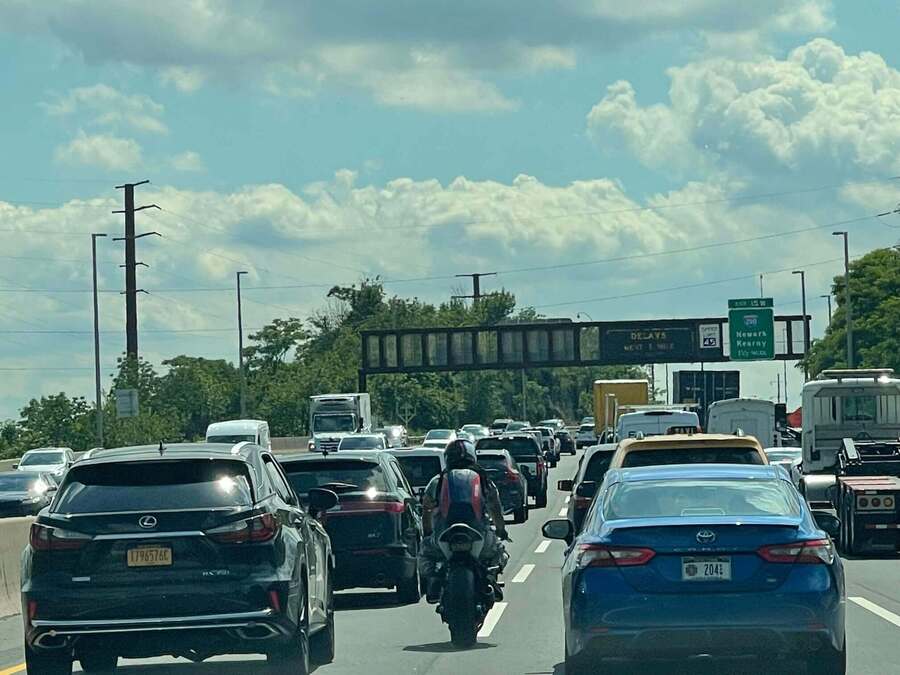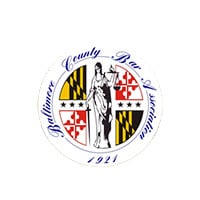Is Lane Splitting Legal in Baltimore, Maryland?

Motorcycle lane splitting is a practice that stirs much debate and often draws negative reactions from other drivers and law enforcement. In Maryland, lane splitting is illegal, and riders must adhere to this regulation to ensure their safety and compliance with the law.
Many advise against it due to safety concerns, and Maryland police may closely monitor motorcyclists to catch any illegal maneuvers. Understanding lane splitting and why some motorcyclists in Baltimore, Maryland, do it can shed light on this controversial topic. Let’s explore the specifics of lane splitting, its risks, and the legal framework in Maryland.
What Exactly is Motorcycle Lane Splitting?
Motorcycle lane splitting, often called white-lining, is when motorcyclists ride between lanes of slow-moving or stationary vehicles. This technique is typically used to avoid congestion and move through traffic more quickly.
Lane Splitting vs Lane Filtering
It’s important to differentiate between lane splitting and lane filtering. Lane splitting involves motorcyclists traveling between lanes of moving traffic, while lane filtering, on the other hand, refers to motorcyclists navigating between lanes of completely stopped traffic, such as at stoplights or during heavy traffic jams. This practice is usually done at much lower speeds and is considered a way to avoid potential rear-end collisions, as motorcycles move to the front of the line where they are more visible and less vulnerable.
The key difference between lane splitting and lane filtering lies in the traffic conditions and speed. Lane splitting occurs with moving traffic and at higher speeds, increasing the likelihood of accidents. Lane filtering, in contrast, is performed at low speeds and when surrounding vehicles are stationary, which generally reduces the risk of collisions.
Despite the similarities, both practices are prohibited in Maryland, highlighting the need to follow local traffic laws to maintain road safety.
Lane Sharing
Another related practice is lane sharing, where two motorcycles ride side by side in a single lane. Unlike lane splitting, lane sharing is legal in Maryland and is considered safer because it involves more predictable movements and better visibility for both motorcyclists and drivers.
Why Do Motorcycle Riders in Baltimore Split Lanes?
Despite the legal restrictions, some motorcycle riders in Baltimore engage in lane splitting. However, understanding the reasons behind why some riders still choose to split lanes can provide insight into their motivations.
The primary reason motorcyclists might lane split is to save time. Baltimore’s traffic congestion can be frustrating, and lane splitting offers a way to maneuver through gridlock and reach destinations faster. This ability to bypass traffic jams and keep moving is a significant advantage for motorcyclists looking to avoid the delays that plague other drivers.
Another motivation is the perceived safety benefit. In heavy, stop-and-go traffic, motorcyclists are at risk of being rear-ended by inattentive drivers. By positioning themselves between lanes, riders can reduce the likelihood of such collisions, as they are no longer directly in the path of trailing vehicles. This “safe zone” between cars can provide a buffer that enhances their visibility and safety.
However, while there may be perceived benefits, the risks associated with lane splitting are considerable. The unpredictable nature of traffic in Baltimore means that drivers may change lanes without warning, potentially causing accidents. Large vehicles with extended side-view mirrors, or drivers and passengers who open doors or windows unexpectedly, can also pose significant hazards to motorcyclists weaving between lanes.
Moreover, some motorcyclists may ride at speeds that are unsafe for lane splitting, further increasing the danger. High-speed lane splitting leaves little room for error and can result in severe accidents. These factors contribute to the legal restrictions on lane splitting in Maryland, emphasizing the importance of adhering to traffic laws designed to protect all road users.
In summary, while the desire to save time and avoid rear-end collisions might tempt some Baltimore motorcyclists to split lanes, the practice remains illegal and dangerous. Adhering to the law and prioritizing safety is crucial for motorcyclists navigating the city’s busy roads.
Why Motorcycle Lane Splitting in Baltimore is So Dangerous
Motorcycle lane splitting in Baltimore presents numerous hazards, largely due to the unpredictable nature of traffic and driver behavior. The limited space available for motorcyclists to weave between cars significantly increases the risk of collisions, especially if drivers change lanes unexpectedly or open doors without checking their mirrors.
The practice of lane splitting can also lead to severe accidents when drivers are unaware of the motorcyclist’s presence. Reduced visibility and reaction time for both parties amplify the danger. High-speed lane splitting is particularly risky, as it leaves little margin for error and can result in catastrophic injuries or fatalities.
Given the dense traffic and frequent congestion in Baltimore, motorcyclists might be tempted to lane split to save time. However, the dangers associated with this practice far outweigh the potential benefits. The combination of unpredictable urban traffic and narrow gaps between vehicles makes lane splitting an especially perilous maneuver in this city.
What Are Maryland Laws For Lane Splitting?
According to Maryland statutes §21–1303, motorcyclists are not permitted to ride between lanes of traffic or adjacent lines of vehicles. This regulation is in place to ensure the safety of all road users by preventing the hazardous behavior associated with lane splitting.
However, as mentioned above, Maryland law does make an exception for lane sharing. Specifically, two motorcycles may share a single lane, riding side by side. This practice is considered safer than lane splitting as it involves more predictable movement patterns and better visibility for both motorcyclists and drivers. It is important to note that this exception is strictly limited to two motorcycles; three or more motorcycles riding abreast in a single lane is unsafe and not allowed.
How Baltimore Motorcycle Accident Lawyer John Leppler Can Help
If you’ve been involved in a motorcycle accident in Baltimore, it’s crucial to seek the assistance of experienced Baltimore motorcycle accident attorney John Leppler. Motorcycle accidents often result in severe injuries and significant financial burdens, making legal guidance essential for navigating the complexities of your case and securing the compensation you deserve.
John Leppler, a dedicated motorcycle accident lawyer at Leppler Injury Law, brings extensive experience and a deep understanding of the unique challenges motorcyclists face on the road. He is committed to protecting your rights and ensuring you receive fair compensation for your injuries, medical expenses, lost wages, and other damages.
Investigation and Evidence Gathering
One of the critical roles of a personal injury lawyer is to thoroughly investigate the incident to determine fault and build a strong case. John Leppler will focus on gathering all relevant evidence, such as:
- Physical Evidence: This includes photos of the accident scene, tire marks, and damage to vehicles and property. These details can provide crucial insights into how the accident occurred.
- Witness Statements: Contacting and interviewing witnesses can offer additional perspectives and corroborate your account of the accident. Witness testimonies are often vital in establishing fault.
- Documentation Review: Examining police reports, insurance documents, and medical records is essential for building a comprehensive case. This paperwork creates a detailed picture of the accident and its aftermath.
Protecting Your Rights and Maximizing Compensation
Insurance companies often try to minimize their payouts by shifting blame onto the victims or offering settlements that are far below what you deserve. John Leppler is well-versed in these tactics and will protect you from such strategies. He will negotiate with the insurance companies on your behalf, ensuring they do not take advantage of your vulnerable situation.
Navigating Contributory Negligence Laws
Maryland, one of five jurisdictions in the United States, along with Virginia, Washington D.C., Alabama, and North Carolina, continues to use contributory negligence instead of comparative negligence. This means that in Maryland if an injured person is found to be even slightly at fault for the accident, they cannot recover any damages from the other party, even if the other party was primarily responsible for the accident.
John Leppler will navigate the contributory negligence laws, ensuring that your rights are protected and that you receive the maximum possible compensation.
Going to Trial if Necessary
If the insurance companies do not offer a fair settlement, John Leppler is prepared to take your case to trial. His extensive courtroom experience and dedication to achieving just outcomes for his clients make him a formidable advocate in court.
Personalized Legal Guidance
John Leppler provides personalized legal guidance and support throughout the entire process. He understands the emotional and physical toll that a motorcycle accident can take and is committed to easing your burden by handling the legal complexities of your case.
Contact Leppler Injury Law Today
John Leppler is dedicated to serving the Baltimore community as a trusted motorcycle accident lawyer. With a passion for protecting the rights of injured motorcyclists, John brings both legal expertise and empathy to every case he handles. At Leppler Injury Law, you can expect personalized attention, honest guidance, and a relentless pursuit of justice on your behalf.
Whether you are facing medical bills, lost wages, or pain and suffering due to a motorcycle accident, John Leppler is here to help you navigate the legal process with confidence and compassion. Contact Leppler Injury Law today to schedule a consultation and let John Leppler advocate for the compensation and justice you deserve.







